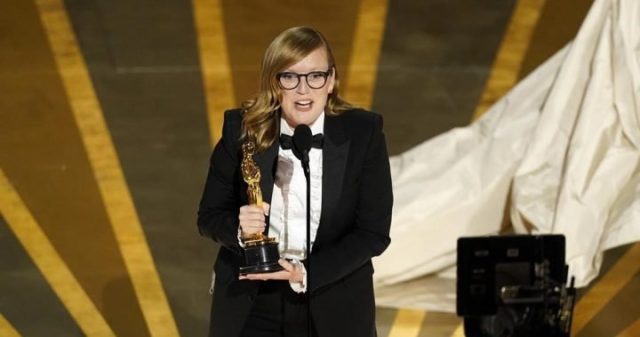Newly minted Oscar-winner Sarah Polley says the decade she spent away from the director’s chair prepared her for this latest phase of her career.
“It didn’t feel like the end of the world if things didn’t work out this time,” the Toronto-born Polley said during a phone call from Los Angeles a day after her best adapted screenplay win for “Women Talking.”
“I have three kids and I knew that if this film was a total disaster, I would go back to my life and be fairly happy.”
Before adapting and directing the film based on Miriam Toews’ 2018 novel of the same name, Polley’s last movie was the 2012 documentary “Stories We Tell.” Three years after its release, Polley would suffer a debilitating concussion, which sidelined her from filmmaking but also gave her time to raise her three kids and self-reflect.
As the lingering effects of her injury lessened, Polly said she returned to filmmaking 10 years older and more comfortable in her skin than she had been in years.
“It’s not my identity, to be a filmmaker,” said Polley. “It’s more connected to my relationship with my children, and so there was some sense in which I could take bigger risks in my career, and bigger risks in my craft because if it didn’t work out, it wasn’t going to kill me.”
That made it easier for her to go into awards season with low expectations, she said. Her identity wasn’t riding on the Academy. She didn’t anticipate a nomination, let alone a win.
It was the first career Oscar for Polley, whose film also received a best picture nomination but lost to the interdimensional drama “Everything Everywhere All at Once.”
“Women Talking” tells the story of a group of women who gather in a hayloft to discuss what steps to take after a series of sexual assaults shocks their remote Mennonite community.
What ensues is a debate about faith, forgiveness and justice that echoes a real-world discourse about violence against women and abuses of power. Its ensemble cast — comprised almost entirely of women — includes Rooney Mara, Claire Foy and Jessie Buckley.
Polley has repeatedly said it was important for her to centre women’s stories in an industry where that happens all too rarely.
“I just want to thank the Academy for not being mortally offended by the words ‘women’ and ‘talking’ being so close together like that,” Polley said as she accepted the award on Sunday night.
“Miriam Toews wrote an essential novel about a radical act of democracy in which people who don’t agree on every single issue managed to sit together in a room and carve out a way forward together, free of violence.
“They do so not just by talking but also by listening.”
Polley said she was driven to open her speech with the light jab after hearing a particular and frequent type of feedback to the title of her film.
“I’ve just found it hysterical how incendiary the title ‘Women Talking’ is to people and that they feel personally attacked by it,” said Polley.
“People respond to it as though it’s called ‘Women Shouting At Me for Being a Bad Person’ or “Women Scolding Me.’ It’s just called women talking and it’s actually fairly innocuous. It’s funny to see the distance between what the actual words are and what the defensive responses can be.
“I do feel people map totally different things onto this film, and come out with different priorities in terms of what it was about, but there have been so many great instances of strangers seeing past the credits to debate and talk in the audience afterwards, which is really a dream come true if you make a film like this.”
Polley’s film beat out “Top Gun: Maverick,” “Living,” “Glass Onion: A Knives Out Mystery,” and “All Quiet on the Western Front.”
She was previously nominated in the same category for the 2007 relationship drama “Away From Her.”
Other Canadian contenders who came away with wins at the Academy Awards included Canadian-American Brendan Fraser who nabbed the best actor award for his role in “The Whale.”
Montreal-born makeup artist Adrien Morot, who was part of the team was also recognized for helping Fraser transform into the 600-pound reclusive professor, took home a statuette for makeup and hairstyling.
Meanwhile, Toronto director Daniel Roher won best documentary for “Navalny” about the plot to kill Russian anticorruption campaigner Alexei Navalny.
© 2023 The Canadian Press











![“I made Shatta Wale who he is today” – Singer Kay Smooth alleges [Video]](https://ghananewss.com/storage/2023/04/Kay-Smooth-Shatta-Wale-100x75.jpeg)

![Mr Logic’s Red Panther record label officially signs two Afro-dancehall artistes[Video]](https://ghananewss.com/storage/2023/05/Mr-Logic-signs--100x75.jpeg)







